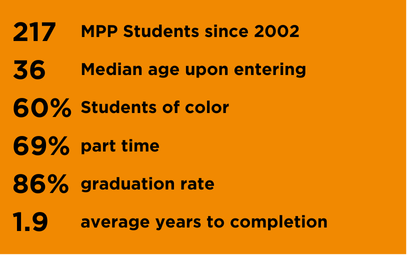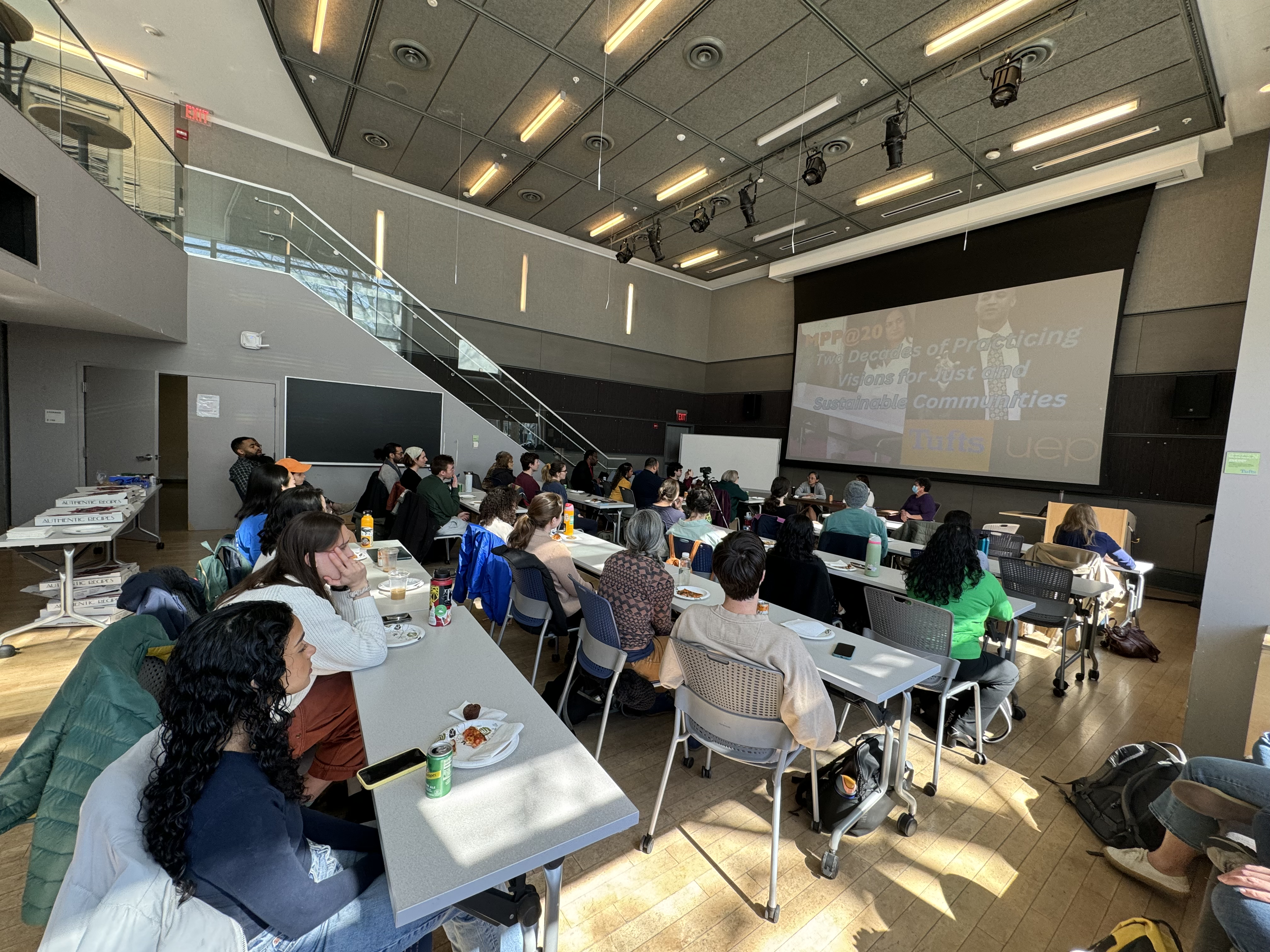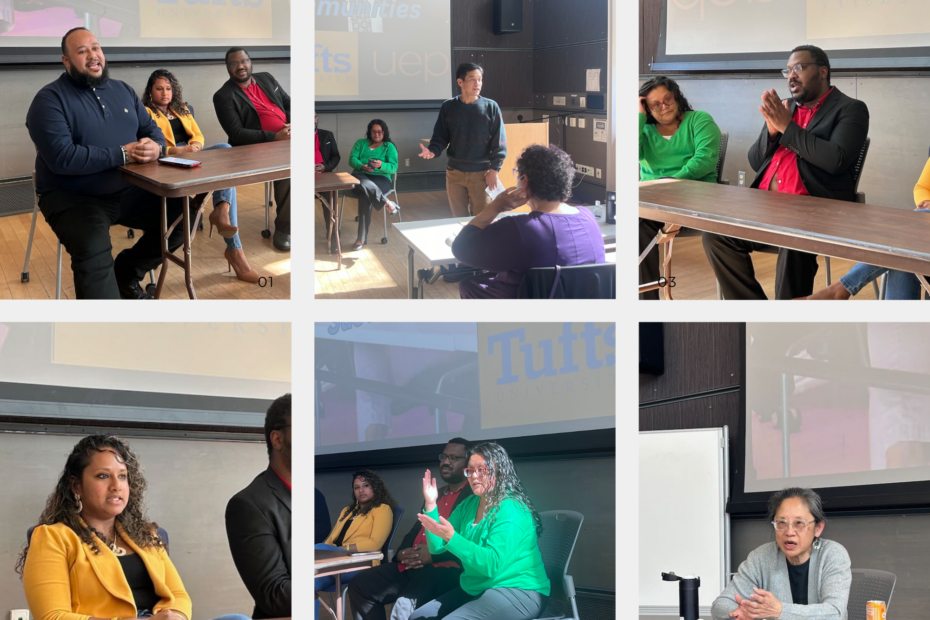In March, the UEP department, Tufts community members, and alums celebrated the 20th anniversary of UEP’s Master of Public Policy (MPP) program. Two panels of current MPP students and alumni spoke about how pivotal the program has been for them and what they have accomplished because of their MPP experience. Now, the program is undergoing a transformation.
Since its creation in 2002, MPP has been a unique professional graduate degree for mid-career practitioners. Its centering of intersectional justice, sustainability, and community-oriented solutions has set the program apart from other MPP programs for over two decades. These attributes, among other contributions, have made this program invaluable not only to MPPers but also to other UEP students, Tufts University, and the broader local community.
This blog post offers a peek into MPP’s past, present, and future to celebrate the program’s wide-reaching success before looking to the changes ahead.
Past: MPP’s 20-year history and impact
Much of this section’s information about MPP’s past came from the MPP@20 Spring 2024 Report, put together by Gastón Neville, a rising second-year UEP student, and from the MPP@20 Panel event recording and slide deck organized by Penn Loh, the outgoing Director of the MPP program. I recommend reading the report and watching the recording for a more complete story of MPP’s achievements.
MPP was developed under UEP Professor Emerita Rachel Bratt in the late 1990s and established in 2002. “In many ways, it was the inspiration of James Jennings, emeritus professor,” Julian Agyeman said. “James has a long history of working with leaders from underrepresented groups. This was the background to a Master’s in Public Policy, which was to have a very UEP spin that would not be just a replica of the traditional MPP, but one that was more responsive to local neighborhood leadership needs. That was really the focus, which differentiated it from many other programs at the time.” Its mission was to provide a pathway for mid-career practitioners with at least seven years of experience in urban and environmental policy and planning to earn a master’s degree while enriching the learning experience of other students at UEP and Tufts.
A pillar of the MPP program has been the Neighborhood Fellowship (NF), which has brought up to five accomplished urban leaders to UEP MPP each year. Professor Emeritus James Jennings established the NF program in 2005 with the support of Provost Jamshed Barucha. Since then, the program has enriched the educational experience at Tufts by bringing longtime professionals, organizers, and community activists together with younger students.
When I asked current MPP student and NF Chelli Keshavan what was special about this program to her when she first applied, she said: “Logistically, this was the only one available to me because of the Fellows Program. But that aside, I chose it because I think we do a really good job of living the values we talk about instead of just talking about them. The Fellows Program is evocative of doing just that. I love that. We expect ourselves to blend theory and practice. I love that we expect ourselves to continually push for a refined understanding of where people are in the world and their context and why. For example, I know in Julian’s classes, we’ve had a lot of discussion of what it takes to mobilize the community. So I think that UEP MPP is a place where we’re literally figuring out how to give communities back their power, and then designing policy to make sure that it doesn’t get taken away again.”

MPP has attracted practitioners from diverse professional experiences and life backgrounds throughout its 20-year history. It is broadly recognized as a social justice and community-oriented public policy program in a department that actively works toward more inclusive, just, participatory, tolerant, and sustainable communities, regions, and ecosystems. MPP students have included public officials, agency heads, executive directors, and program staff from a broad range of sectors. Many MPPers focus on critical issues facing lower-income communities and communities of color, such as affordable housing, community and economic development, social policy, health equity, and environmental justice.
Most (60%) of all MPP students have been people of color, the highest among all UEP programs. Amongst the 217 who have been in the program, the racial/ethnic composition is 40% White, 31% Black, 18% Latinx, and 11% Asian. Of NFs, the composition has been 1% White, 55% Black, 32% Latinx, and 12% Asian. Though NFs account for two-thirds of students of color in MPP, the program attracts even more students of color, who account for 20% of all MPP students. A strong majority of MPPers have been women (66%), which follows the trend in the UEP student body overall. The age range of MPPers has been from 27 to 72, though most are in their 30s and early 40s. Only 24% of MPPers are over 45 upon entering.
Among the program’s most notable impacts is that MPP alums and students are consistently significant forces for change in the Boston region and beyond. Because the concentration of MPP and UEP graduates is so high in the area, many continue to work together and collaborate, making tangible strides toward justice and sustainability. For example, the groundbreaking fair housing zoning amendment in the City of Boston in 2020, known as Affirmatively Furthering Fair Housing, was spearheaded by MPP alum working with other UEP alums, faculty, and students. In the years leading to this policy, MPP and NF alum Bob Terrell spearheaded the community coalition as Executive Director of the Fair Housing Center of Greater Boston. He worked with UEP Professor Emeritus James Jennings and others to develop the research and evidence to support this amendment. UEP MA alum Joel Wool was the policy director for City Councilor Lydia Edwards and helped champion this amendment from within City Hall. Two UEP MA students interned with organizations working on this initiative and finished their master’s theses based on this work.

Another stand-out MPP and NF alum who has been a force for change is María Belén Power, one of the panelists at the MPP@20 event. When she started the program in 2016, she was the Executive Director of Greenroots, a nonprofit working to achieve environmental justice and better quality of life in Chelsea, East Boston, and surrounding communities. María Belén graduated from the MPP program in 2020 and, since then, became the Undersecretary of Environmental Justice and Equity at the Massachusetts Executive Office of Energy and Environmental Affairs with Secretary Rebecca Tepper. She said of the MPP NF program,
“I don’t think I would be where I am right now with the administration if it wasn’t for the opportunity I had…It certainly has shaped my professional career in Massachusetts, and who I am. I’m a Latina, I came to Massachusetts, about 12 years ago, and made incredible connections with folks in the program… it also broadened my horizon. I was very focused on immigrants rights and workers rights. I felt like the environmental world was for other folks. I want to work with Latinos. Then really, very quickly realized that the very same populations that are experiencing deportation and wage theft, are also suffering from high rates of asthma and public health concerns. So, my focus continues to be the people, initially of Chelsea and now of the Commonwealth, around environmental justice, and equity and making sure the state does the best it can to advance environmental justice.”
So many MPPers who have gone through the program have gone on to fight for environmentally and socially just communities. Other examples can be found here.
You can’t talk about the history of the MPP program without talking about Penn Loh. Penn is a Distinguished Senior Lecturer who has been the Director of the MPP program since 2013, half of the MPP program’s lifespan. Chelli Keshavan said, “Inevitably when I initially bonded with the fellows, we would bond about how we were seen by Penn. Many of us struggled with imposter syndrome before deciding to apply to MPP, but Penn helped us see our strengths.” As the program is reenvisioned, Penn will pass the torch to a new MPP program Director.
Present: MPP’s Reenvisioning
The MPP program is currently paused as it undergoes a reenvisioning. According to Mary Davis, associate professor and outgoing UEP department chair, the purpose of the pause is to “grow and explore the ways that the MPP could adapt to the needs of future students and a changing job market.”
According to Mary, strategies to identify the needs of future students and a changing job market will likely include focus groups, community input, student input, and a market analysis that has already been conducted. However, the MPP program’s Reenvisioning Committee, headed by Julian Agyeman, will ultimately determine these metrics. Other committee members include two former MPP NFs, Allenza Michel and Bob Terrell, former MPP program director Penn Loh, incoming UEP department chair Peilei Fan, and ex officio members from the Dean’s office.
Tufts and UEP programs undergo periodic assessment and revision to adapt to changing needs and circumstances. UEP’s Master of Science and Sustainability, launched in the fall of 2019, and its GIS Certificate, launched 2019, are examples of programs that resulted from such a revision.
“After 20 years of running a program, we were due, long overdue perhaps, for an evaluation and look at releasing new opportunities,” Julian Agyeman said. “This is the right time to evaluate and build on the strength of MPP. This isn’t about identifying weaknesses. This is about building strengths.”
About the MPP program transformation, Chelli Keshavan said, “In my head, we have a really special moment to sort of do exactly what we’re all really equipped to do: think hard about what MPP can be, should be, will be. Maybe a depth of conversation around who we want to become and making sure that we’re aligning with the values that we purport daily.”
The Reenvisioning Committee is scheduled to meet again when faculty return in the fall.

Future: MPP’s Transformation
As the head of the Reenvisioning Committee, I asked Julian Agyeman a few questions about his ideas and expectations for the reenvisioning process and the future of the program:
What will your process be for generating and prioritizing new ideas for the new MPP program? What are your personal goals?
“My personal goal here is to come up with a robust, consensual process that really takes the MPP to the next level. I’m not interested in growth for growth’s sake, and just getting more bums on seats. I’m more interested in developing a program that really challenges students to think about today’s world through the sustainability, social justice, and equity lens that we’ve pioneered for the last 50 years at UEP. We’ve got a committee, none of whom are shy to come forward with ideas. I’m not going to have to twist people’s arms to come out with ideas. They’re going to be flowing. I want it to be a consensual approach. I want us to show that there are different ways of running an MPP other than what all the other elite schools are doing.”
How would you describe MPP programs at other schools, and how is UEP’s MPP program different?
“A lot of these MPP programs are sort of cookie cutter, focusing on technical skills, rather than on the moral and ethical framework that we work under at UEP. At UEP there’s a scaffolding of values around social justice, equity, anti-racism, LGBTQIA-friendly—all of that is our framework. And we develop our courses and our curriculum in accordance with that, whereas many other MPPs that I see are just about what the market wants: technically proficient, sort of supersleuth, ‘we’re gonna go solve the world’s problems.’ The world’s problems aren’t technological, and scientific, they’re much deeper than that. They are ethical, they are moral. That’s where I think we can really help craft a program that both has its grounding in morals and ethics and developing public policy that enhances human dignity and empathy, but also one where students do have those technical skills. So it’s not a binary one or the other. You need both…[at UEP] we don’t always know the answers, but we’re asking the right questions. A lot of places, they ask questions that they know answers to. Those are often the very scientific, environmental, or economic things. But when it comes to equity and social justice, what are the answers? It’s more difficult when you’re talking about these ethical and moral issues, to define answers, but we surely must be asking the question. That is always the way that we felt at UEP.”
What are some of the MPP program’s strengths that you expect to build on?
“One thing we did very, very, very well was to empower local leaders. But what we didn’t really do was to look more internationally. I think, and I think Mary and the Provost thinks, that there’s a new generation of potential MPP students who are probably slightly younger than the current cohort and want a more international MPP. Does that mean get rid of the local focus? No. I think we just build on the local focus, the neighborhood focus. And perhaps it’s an option, you know, a global focus. So maybe students come in and pick an option, neighborhood or the global. Again, no decision has been made, but I think these ideas will be on the table…One thing I think, that we’re all keen on, is that, at Tufts UEP, we don’t just try and model ourselves on somebody else. We’ve never done that. In fact, I remember a quote from the founder Hermann Field 30 something years ago, he said, ‘Don’t let UEP lose, it’s cutting edge.’ That’s, that’s our niche. Social justice, sustainability, inequality, intersectionality. These words mean much more to us than they do some places where they just quote them, but their courses don’t seem to reflect them.”
What are some other changes that the Reenvisioning Committee is considering?
“We’ve only had our intro meeting where the committee was introduced and the scope was outlined by the Dean. We don’t have any concrete ideas at the moment. However, we want to look into funding for this program, we want to look into different pedagogical models. So for instance, you look at the cohort currently, and it is predominantly older than most of our other programs. Is there a younger cohort that would want to come and do an MPP? Would they be the ones that want to focus more internationally? Is there a way that we can develop a pedagogical model that the younger, perhaps more internationally focused can work alongside the older, perhaps more neighborhood focused? And what would that pedagogical model be? Everything’s on the table. Modality is another discussion, you know, will we offer online options? Or is it going to be all in person? Will there be a low residency option where people are predominantly online but then there’s a one week summer school? We’re not discounting anything at the moment. Everything’s on the table. Some things will fall by the by, some things will become prioritized, but at the moment, I’m very excited by the energy that’s surrounding this revision and, and the potential that this revisioning has to really, again, keep UEP at the cutting edge.”
Two decades of inclusive excellence and many more to come
The MPP program has been a 20-year story of success. It has shaped the careers of 217 students by giving them the tools, knowledge, and belief in themselves to go out into the world and be a force for change. With the highest proportion of students of color, the MPP program has led in reaching UEP and Tufts’s diversity, equity, and inclusion goals. The program exemplifies how UEP’s programming builds off of a framework of sustainability, equity, and justice rather than leaving those words on a page. The reenvisioning of this program aims to build on these strengths and maintain its cutting edge as a unique MPP program rooted in social and environmental equity and justice while responding to the needs of future students and a changing job market. “We are change agents,” Mary said. “We are looking at the future. And we were looking at how to make a program stronger, more sustainable. And still have the strongest elements of the past, blended in with a future program.”
